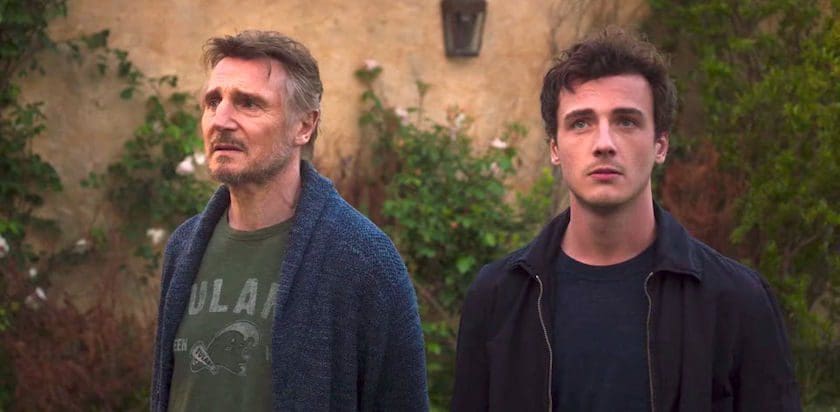
Made in Italy is filled with plenty of star power—both onscreen and behind the camera. It’s about a father and son rebuilding their relationship as they rebuild their Tuscan home and it stars real life father and son duo, Liam Neeson and Michael Richardson, with James D’Arcy–who many might know as Jarvis in Agent Carter–making his directorial debut.
The film follows Jack (Richardson), a young, English art gallery owner who is about to lose it to his wife Ruth (Yolanda Kettle) in their divorce. Thus, Jack looks to sell his deceased mother’s, Raffaella (Helena Antonio), family home in Tuscany, but needs to consult with his estranged father Robert (Neeson), a struggling artist, first. However, upon arriving, the house is in total shambles. The front door is barely standing, there’s a feral ferret wreaking havoc, and the paint is chipping off of the walls. Really, the only things that have remained well kept are the “bones” of the house and the gorgeous views around it. As the pair fix-up the house, they also begin to reconcile with their unresolved feelings about Raffaella’s death and mend their relationship.
Since Neeson has pretty much had a yearly stint as an action hero since Taken really changed his career path, Made in Italy seems like a perfect film for him to re-establish his well-rounded skills as an actor. Not to mention, with his son right beside him and their strong connection to story since they’ve gone through a similar loss after Neeson’s wife, Natasha Richardson, died tragically back in 2009, there was a strong possibility to see Neeson in a different light. While we do see this slightly, mainly thanks to his solid connection with his son onscreen, the script and Neeson’s unbreakable persona make it hard for a completely refreshing experience.
Instead of having Jack and Robert’s unresolved feelings be a strong thread throughout the film, they take a backseat to more uninteresting plot threads. The whole idea of Jack and Robert rebuilding the house together is totally wasted on a comedic sequence about old Italians and the film eventually just becomes watching Neeson and Richardson on a vacation in Tuscany. There are definitely some nice, light-hearted moments with them interacting with some of locals and Jack developing a romantic connection with a local chef/restaurant owner named Natalia (Valeria Billelo), but it never breaks past surface-level emotions. It also makes the Jack’s eventual blow-up towards his father come off out of the blue and they end up being obstacles in the way of the film’s much more compelling emotions of Jack and Robert confronting their grief.
Neeson and Richardson also just seem kind of uncomfortable with the script. From Neeson having a moment where he talks about hentai manga to him trying to talk to Jack about how to get rid of the ferret, there’s just something off about seeing Neeson like this. Perhaps he’s reached a point where he’s been in the action game for too long, as it’s hard to see him as, well, normal here—or whatever normal is for this movie. There’s even something about their onscreen chemistry that seems off and it’s hard to see Jack and Robert as a normal father and son because the script wants them to come off comedic in a way that they don’t seem used to in real-life.
For the first two-thirds of Made in Italy, outside of a couple funny moments that Neeson and Richardson sell well, it was hard to see if the film would find a way give them something to work with. However, the final act really starts to bring together, as Jack and Robert come to a head over Raffaella’s death. The comedic energy between Neeson and Richardson works much better as there are more light-hearted moments that play to their strengths. There’s a great scene where they try to tell Natalia all about a dish they didn’t actually make or a moment of Robert revealing a portrait he did of Natalia that had me cracking up because of how well Neeson sells it. There’s even a great moment of Neeson telling off crappy buyers that make his love for the house clear. Even the tear-jerking emotions that come from Jack and Robert opening up about their estranged relationship feel much more fitting than everything before.
As Jack and Robert start to feel the sense of home they once felt with Raffaella there, they really start to become incredibly endearing. They open up about their recent romantic fallouts, how they silently hurt one another for many years, and even dive into the day that she died. Neeson and Richardson bring out some incredibly genuine emotions that evoke this total release of pain that viewers will definitely feel because these two are finally allowed to sort of let loose. The film also doesn’t take easy routes, as Jack and Robert still have other issues to solve and more growing up to do that are both fascinating and compelling to watch. It’s a genuinely feel-good ending that’s memorable and what the entire film should’ve felt like.
If the old saying of “it’s about the journey, not the destination” is true, then Made in Italy fails at achieving it. It might boast a strong third act of a father and son confronting their issues, but it ultimately gets in its own way in creating a fully-enriching experience about grief and light-hearted laughs.

